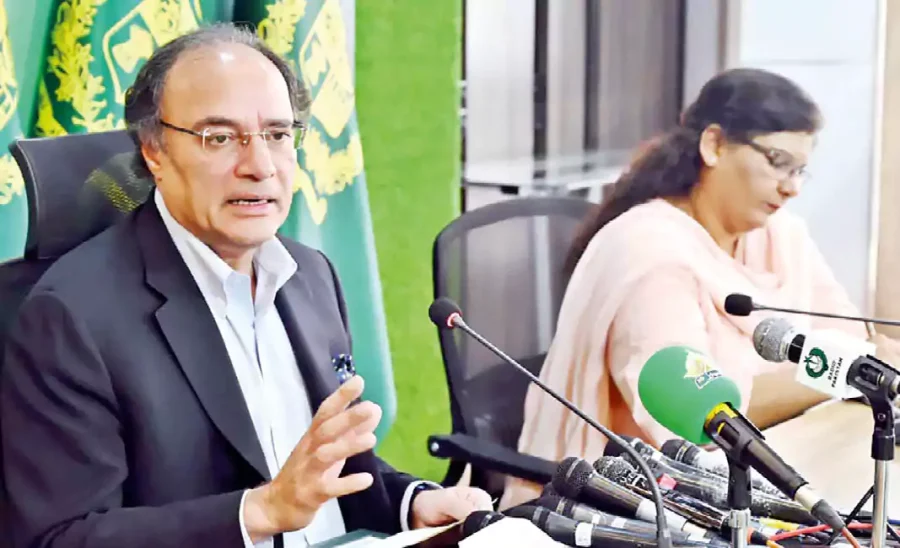Federal Minister for Finance and Revenue Muhammad Aurangzeb expressed optimism on Sunday Pakistan would secure a “larger and longer” bailout agreement in its negotiations with the International Monetary Fund (IMF) in July, following the approval of the
$67.76 billion federal budget.
Pakistan began discussions about a new loan with IMF officials soon after completing a $3 billion program that helped the country stave off a sovereign debt default last year.
The international lending agency sent its delegation to Pakistan in May to hold negotiations with the new government. Prime Minister Shehbaz Sharif also confirmed during a speech at the National Assembly that his administration had prepared the budget in consultation with the IMF, after repeatedly emphasizing the importance of securing another bailout facility to keep macroeconomic reforms on track.
“I have already said we are moving in a positive way,” the finance minister said while discussing the fresh IMF program during a media interaction in the federal capital. “During July we should get into a good agreement.”
“I am very optimistic that we will be able to take it through the finish line for an extended fund program, larger and longer in nature,” he added. Pakistan has sought IMF loans in recent years due to a combination of economic challenges, including significant fiscal and current account deficits, declining foreign exchange reserves and rising public debt.
These economic vulnerabilities have been exacerbated by external shocks like fluctuating commodity prices and internal challenges such as political instability and policy inconsistency. The government has maintained the country’s economy is on the mend but
considers the new bailout important to ensure a substantial financial cushion.
The finance minister reiterated that he viewed the program being funded and supported by the IMF as part of Pakistan’s own endeavor to strengthen itself economically. “We need the IMF because not only these IFIs [international financial institutions] but even our friendly nations want a backstop which is the fund program,” he continued. “What we have to do in the next three years to make sure this is the last program.” He mentioned he had already been in virtual discussions with the
IMF to move toward a staff-level agreement.
Aurangzeb said the basic framework, including the prior actions, had been formulated while the IMF delegation was in Pakistan, saying that the structural benchmarks of the program had been the same for the last three or four years while Pakistan had not implemented. “Now we have told them to trust us and we will get this done,” he added. The finance minister said Rs750 billing corruption was uncovered in sales tax, urging reforms in the Federal Board of Revenue (FBR). Aurangzeb revealed that a significant corruption of Rs750 billion rupees has been uncovered in sales tax.
He assured that measures are being taken to address this, with sales tax refunds amounting to over Rs50 billion to be processed within the next 2-3 days. He also mentioned that Rs2700 billion are stuck due to tax cases, and resolving even half of these would be highly beneficial for the economy.
He highlighted key areas of progress and ongoing reforms aimed at bolstering Pakistan’s economy. He emphasized that the government’s efforts have restored the confidence of foreign institutions, as evidenced by the World Bank’s approval of a $1 billion project for Pakistan. Additionally, the nation’s foreign exchange reserves stand at $9 billion.
Aurangzeb urged the need to facilitate foreign investors, revealing ongoing talks about investment opportunities in the country. He expressed optimism about achieving the Federal Board of Revenue’s (FBR) tax target of 9300 billion rupees and mentioned that taxes are being paid at a rate of 12% of GDP over the past three years.
The minister outlined plans for reforms in the energy and petroleum sectors, highlighting that improvements in these areas would lead to sustainable economic stability and stressed importance of curbing tax evasion and preventing corruption through FBR digitization, which he believes will increase transparency and efficiency in tax collection.
The Finance Minister announced that the construction sector and the supply side are being brought into the tax net. A new pension scheme is set to be implemented from tomorrow, aimed at providing better financial security for retirees.










